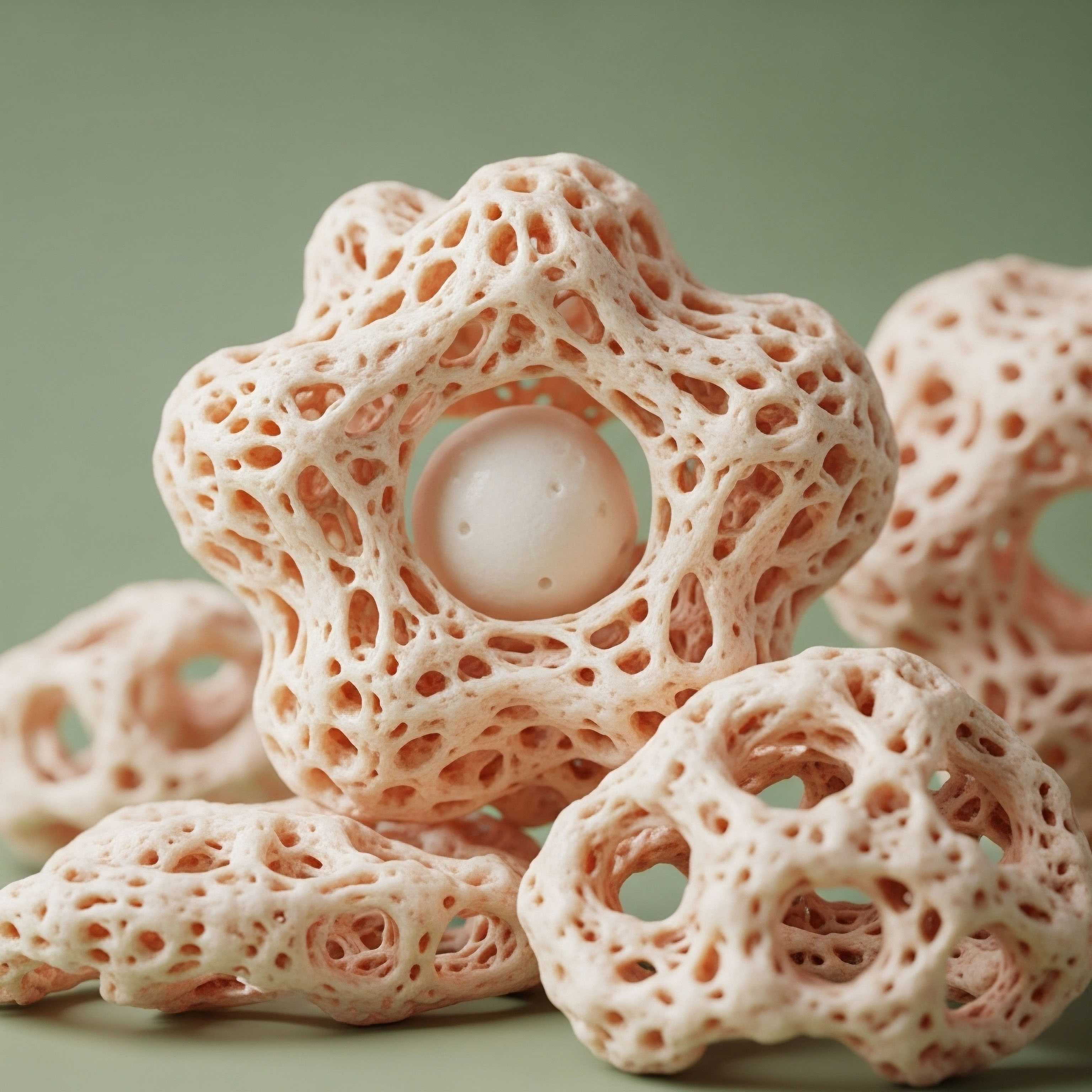

Fundamentals
Do you ever find yourself pausing, searching for a word that once came effortlessly, or walking into a room only to forget why you entered? Perhaps you notice a subtle dimming of your mental clarity, a slight hesitation in your thought processes that wasn’t there before.
These moments, often dismissed as simply “getting older,” can stir a quiet concern, a feeling that a vital part of your self is becoming less vibrant. This experience is deeply personal, and it signals a potential shift within your biological systems, particularly your endocrine network.
Your body operates as an exquisitely synchronized orchestra, with hormones serving as the conductors, guiding every cellular process. These chemical messengers, produced by glands throughout your system, regulate everything from your mood and energy levels to your sleep patterns and, critically, your cognitive function. When this intricate hormonal balance begins to waver with advancing years, the effects can ripple across your entire being, including the sharpness of your mind.
The question of whether hormonal interventions can support cognitive function as we age is a significant one. It speaks to a desire to maintain mental acuity and vitality, to continue living a life of purpose and engagement. Understanding the foundational biology of how hormones interact with your brain provides a powerful lens through which to view these changes, offering pathways toward reclaiming mental sharpness.

The Endocrine System and Brain Health
The endocrine system, a collection of glands that produce and secrete hormones, acts as the body’s internal messaging service. Hormones travel through the bloodstream, delivering instructions to cells and organs far and wide. The brain, far from being an isolated entity, is profoundly influenced by these hormonal signals. Receptors for various hormones are abundant in brain regions vital for memory, learning, and executive function.
Hormones act as vital messengers, orchestrating countless biological processes, including the intricate functions of the brain.
Consider the hypothalamic-pituitary-gonadal (HPG) axis , a central regulatory pathway. This axis involves the hypothalamus, a brain region that oversees many bodily functions; the pituitary gland, often called the “master gland” for its role in controlling other endocrine glands; and the gonads (testes in men, ovaries in women), which produce sex hormones.
This interconnected system ensures a delicate balance of hormones like testosterone and estrogen, which are not solely reproductive in their actions. They exert widespread effects on brain cells, influencing neuronal health, synaptic connections, and even the creation of new brain cells.
When hormonal output from the gonads declines with age, as seen in male andropause or female menopause, the brain’s exposure to these neuroactive steroids diminishes. This reduction can contribute to the cognitive changes many individuals experience, such as difficulties with verbal recall, processing speed, or maintaining focus. Recognizing this connection is the initial step toward exploring how targeted support might help restore a more optimal environment for brain function.

Why Do Hormones Matter for Your Mind?
Hormones play a multifaceted role in supporting cognitive health. They influence:
- Neurotransmitter Production ∞ Hormones can affect the synthesis and release of neurotransmitters, the chemical signals that transmit information between brain cells.
Acetylcholine, critical for memory, and dopamine, involved in attention and motivation, are examples of neurotransmitters influenced by hormonal status.
- Synaptic Plasticity ∞ This refers to the brain’s ability to strengthen or weaken connections between neurons over time, a fundamental process for learning and memory.
Hormones like estrogen and testosterone have been shown to support synaptic plasticity.
- Neurogenesis ∞ The creation of new neurons, particularly in the hippocampus, a brain region central to memory formation, is influenced by hormonal signals. A decline in certain hormones can reduce this regenerative capacity.
- Cerebral Blood Flow ∞ Adequate blood flow to the brain ensures a steady supply of oxygen and nutrients.
Hormones can influence the health and function of blood vessels within the brain, impacting overall cognitive performance.
- Inflammation and Oxidative Stress ∞ Chronic low-grade inflammation and oxidative stress are contributors to age-related cognitive decline. Some hormones possess properties that can help mitigate these detrimental processes within the brain.
Understanding these foundational principles sets the stage for a deeper exploration of how specific hormonal interventions can be thoughtfully applied to support brain health as part of a comprehensive wellness strategy.


Intermediate
As we move beyond the foundational understanding of hormones and brain function, the discussion naturally shifts to the precise clinical protocols designed to address age-related hormonal shifts. These interventions are not merely about replacing what is lost; they are about biochemical recalibration, aiming to restore a physiological balance that supports optimal systemic function, including cognitive vitality. The approach is highly individualized, considering each person’s unique hormonal profile, symptoms, and health objectives.

Targeted Hormonal Optimization Protocols
Hormonal optimization protocols are tailored to specific patient groups, recognizing the distinct endocrine landscapes of men and women. These strategies aim to gently guide the body back toward a state of equilibrium, supporting the intricate feedback loops that govern hormonal production and action.

Testosterone Replacement Therapy for Men
For men experiencing symptoms of low testosterone, often termed andropause, Testosterone Replacement Therapy (TRT) can be a transformative intervention. Symptoms such as reduced mental sharpness, diminished motivation, and changes in mood can often be linked to declining androgen levels. The standard protocol typically involves weekly intramuscular injections of Testosterone Cypionate (200mg/ml). This method provides a steady delivery of the hormone, helping to stabilize levels and alleviate symptoms.
To ensure a comprehensive and balanced approach, TRT protocols for men often include additional medications. Gonadorelin , administered via subcutaneous injections twice weekly, helps maintain the body’s natural testosterone production and preserves fertility by stimulating the pituitary gland to release luteinizing hormone (LH) and follicle-stimulating hormone (FSH). This is a thoughtful consideration, as exogenous testosterone can suppress endogenous production.
Another key component is Anastrozole , an oral tablet taken twice weekly. This medication acts as an aromatase inhibitor, blocking the conversion of testosterone into estrogen. While some estrogen is necessary for men’s health, excessive conversion can lead to undesirable side effects and potentially counteract the benefits of testosterone optimization. In some cases, Enclomiphene may be incorporated into the protocol to further support LH and FSH levels, offering another avenue for endogenous testicular function.
Testosterone Replacement Therapy for men aims to restore hormonal balance, addressing cognitive and other systemic symptoms associated with declining androgen levels.

Testosterone Replacement Therapy for Women
Women also experience a decline in testosterone, which plays a significant role in their overall well-being, including cognitive function, mood, and libido. For pre-menopausal, peri-menopausal, and post-menopausal women with relevant symptoms, testosterone optimization can be highly beneficial. Protocols typically involve lower doses than those for men, often utilizing Testosterone Cypionate at 10 ∞ 20 units (0.1 ∞ 0.2ml) weekly via subcutaneous injection.
The inclusion of Progesterone is often based on the woman’s menopausal status. Progesterone is a crucial hormone for female health, influencing mood, sleep, and brain function. For some women, Pellet Therapy , which involves long-acting testosterone pellets inserted subcutaneously, offers a convenient and consistent delivery method. When appropriate, Anastrozole may also be used in women to manage estrogen levels, particularly if there is a tendency toward excessive estrogen conversion.

Protocols for Specific Needs
Beyond general hormonal optimization, specific protocols address unique circumstances, such as fertility preservation or the desire to enhance recovery and vitality.

Post-TRT or Fertility-Stimulating Protocol for Men
For men who have discontinued TRT or are actively trying to conceive, a specialized protocol helps to restore natural hormonal function and support fertility. This typically includes:
- Gonadorelin ∞ To stimulate the pituitary gland and encourage natural testosterone production.
- Tamoxifen ∞ A selective estrogen receptor modulator (SERM) that can help increase LH and FSH by blocking estrogen’s negative feedback on the pituitary.
- Clomid (Clomiphene Citrate) ∞ Another SERM that stimulates gonadotropin release, thereby boosting endogenous testosterone production.
- Anastrozole (optional) ∞ May be included to manage estrogen levels during the recovery phase, if indicated.

Growth Hormone Peptide Therapy
Growth hormone peptides offer a sophisticated approach to supporting various aspects of health, including anti-aging, muscle gain, fat loss, and sleep improvement, all of which indirectly influence cognitive well-being. These peptides are not growth hormone itself, but rather growth hormone secretagogues , meaning they stimulate the body’s own pituitary gland to produce and release more growth hormone.
Key peptides utilized in these protocols include:
- Sermorelin ∞ A growth hormone-releasing hormone (GHRH) analog that stimulates the pituitary to release growth hormone in a pulsatile, physiological manner.
- Ipamorelin / CJC-1295 ∞ These peptides work synergistically. Ipamorelin is a selective growth hormone secretagogue, while CJC-1295 is a GHRH analog that extends the half-life of growth hormone release.
Their combination can lead to a sustained increase in growth hormone levels.
- Tesamorelin ∞ A GHRH analog specifically approved for reducing abdominal fat, which has metabolic benefits that can indirectly support cognitive health.
- Hexarelin ∞ Another growth hormone secretagogue, known for its potent effects on growth hormone release.
- MK-677 (Ibutamoren) ∞ An oral growth hormone secretagogue that stimulates growth hormone release and increases IGF-1 levels.
These peptides can influence brain health by supporting neurogenesis, synaptic plasticity, and reducing inflammation, thereby contributing to improved cognitive function and overall vitality.

Other Targeted Peptides
Beyond growth hormone secretagogues, other specialized peptides address specific physiological needs:
- PT-141 (Bremelanotide) ∞ Primarily used for sexual health, this peptide acts on melanocortin receptors in the brain to influence sexual desire and arousal.
While its direct cognitive effects are not the primary focus, improved sexual health can contribute to overall well-being and mental state.
- Pentadeca Arginate (PDA) ∞ This peptide is utilized for tissue repair, healing, and inflammation modulation. By supporting cellular repair mechanisms and reducing systemic inflammation, PDA can indirectly contribute to a healthier internal environment that is conducive to optimal brain function.
The precise application of these protocols requires careful monitoring of biochemical markers and a deep understanding of their physiological actions. This tailored approach allows for a highly personalized strategy to support cognitive health and overall well-being.
| Intervention Type | Primary Hormones/Peptides | Targeted Benefit (Cognitive & General) |
|---|---|---|
| Male TRT | Testosterone Cypionate, Gonadorelin, Anastrozole, Enclomiphene | Improved mental sharpness, mood, energy, muscle mass, bone density. |
| Female Hormonal Balance | Testosterone Cypionate, Progesterone, Anastrozole | Enhanced cognitive function, mood stability, libido, bone health, reduced hot flashes. |
| Growth Hormone Peptides | Sermorelin, Ipamorelin/CJC-1295, Tesamorelin, Hexarelin, MK-677 | Improved sleep quality, body composition, skin elasticity, potential neurogenesis support. |
| Post-TRT/Fertility (Men) | Gonadorelin, Tamoxifen, Clomid, Anastrozole | Restoration of natural testosterone production, fertility support. |
| Targeted Peptides | PT-141, Pentadeca Arginate | Sexual health enhancement, tissue repair, inflammation reduction. |


Academic
Moving into a more academic exploration, we dissect the intricate neuroendocrine mechanisms through which hormonal interventions might influence age-related cognitive decline. This requires a deep understanding of cellular signaling, neurochemistry, and the complex interplay between various biological axes. The brain is not merely a recipient of hormonal signals; it actively participates in their regulation, creating a dynamic feedback system that can either support or compromise cognitive integrity as years advance.

Neuroendocrine Axes and Cognitive Resilience
The brain’s capacity for sustained cognitive function is intimately tied to the health of its neuroendocrine axes. The Hypothalamic-Pituitary-Gonadal (HPG) axis and the Growth Hormone-Insulin-like Growth Factor 1 (GH-IGF-1) axis are particularly relevant. These systems regulate the production of steroid hormones and growth factors that are critical for neuronal survival, synaptic plasticity, and neurogenesis.
A decline in the efficiency of these axes with age can lead to a less hospitable environment for brain cells, contributing to cognitive changes.
Consider the impact of estrogen on the female brain. Estrogen receptors (ERα and ERβ) are widely distributed throughout brain regions vital for cognition, including the hippocampus and prefrontal cortex. Estrogen exerts neuroprotective effects through multiple pathways. It can modulate neurotransmitter systems, particularly the cholinergic system, which is crucial for memory and attention. Research indicates that estrogen can increase the concentration of choline acetyltransferase, an enzyme essential for acetylcholine synthesis.
Furthermore, estrogen supports synaptic plasticity , the ability of synapses to strengthen or weaken over time, which is fundamental for learning and memory formation. It also stimulates adult neurogenesis in the dentate gyrus of the hippocampus, a process that declines with age and estrogen deprivation.
The timing of estrogen intervention appears critical; early initiation of hormonal support, particularly within a “critical window” around menopause, may offer more significant neuroprotective benefits compared to later initiation. This highlights the importance of proactive, rather than reactive, strategies.

Androgens and Brain Function
For men, testosterone and its metabolites, such as estradiol (converted from testosterone via aromatase) and dihydrotestosterone (DHT), play significant roles in brain health. Testosterone receptors are present in various brain regions, influencing spatial cognition, verbal memory, and executive functions. Studies have explored the association between endogenous testosterone levels and cognitive performance, with some indicating that lower levels are linked to deficits in verbal fluency, visuospatial abilities, and memory.
The mechanisms through which testosterone influences cognition include its effects on neuronal survival, myelination, and the modulation of neurotransmitter systems. Testosterone can also influence cerebral blood flow and reduce neuroinflammation, contributing to a healthier brain environment. While some intervention studies have shown improvements in specific cognitive domains with testosterone supplementation, results have been varied, underscoring the complexity of individual responses and the need for precise, personalized protocols.

Growth Factors and Neuroprotection
The GH-IGF-1 axis is another powerful modulator of brain health. Growth hormone (GH) and its primary mediator, Insulin-like Growth Factor 1 (IGF-1), are known to cross the blood-brain barrier and exert direct effects on neuronal function. IGF-1, in particular, mediates several beneficial effects on learning, depression, angiogenesis, and hippocampal neurogenesis.
Deficiencies in GH, whether due to aging or specific conditions, have been linked to cognitive impairment, including deficits in memory and attention. Growth hormone replacement therapy has shown promise in ameliorating these impairments, suggesting a direct role for GH in supporting cognitive function. The neurotrophic effects of GH and IGF-1 include promoting neuronal survival, enhancing synaptic transmission, and supporting the integrity of cerebral capillary networks, which are vital for nutrient and oxygen supply to brain tissue.
The intricate interplay of neuroendocrine axes, particularly the HPG and GH-IGF-1 systems, profoundly shapes cognitive resilience throughout life.
Peptides like Sermorelin and Ipamorelin/CJC-1295 act as growth hormone secretagogues, stimulating the pituitary gland to release GH in a more physiological, pulsatile manner. This approach aims to restore the body’s natural production of GH, rather than introducing exogenous hormone directly. The downstream effects of increased GH and IGF-1 can include enhanced neuroplasticity, improved sleep architecture (which is critical for memory consolidation), and a reduction in systemic inflammation, all contributing to a more robust cognitive landscape.
| Hormone/Axis | Key Brain Regions Affected | Mechanisms of Cognitive Support |
|---|---|---|
| Estrogen (HPG Axis) | Hippocampus, Prefrontal Cortex, Amygdala | Modulates neurotransmitters (acetylcholine), supports synaptic plasticity, stimulates neurogenesis, reduces neuroinflammation. |
| Testosterone (HPG Axis) | Hippocampus, Cortex, Amygdala | Influences neuronal survival, myelination, cerebral blood flow, modulates neurotransmitters, anti-inflammatory actions. |
| GH-IGF-1 Axis | Hippocampus, Cerebral Cortex, Hypothalamus | Promotes neurogenesis, enhances synaptic transmission, supports brain plasticity, maintains cerebral capillary networks. |

Metabolic Pathways and Neurotransmitter Function
Beyond direct hormonal signaling, the endocrine system profoundly influences metabolic pathways that are inextricably linked to brain health. Insulin resistance , for example, a condition where cells become less responsive to insulin, has been associated with impaired brain glucose metabolism, increased inflammation, and cognitive dysfunction. Hormonal balance, particularly involving sex steroids and growth hormone, can influence insulin sensitivity and overall metabolic health, thereby indirectly supporting cognitive function.
The brain’s energy supply is predominantly glucose-dependent. When metabolic efficiency declines, the brain may struggle to meet its energy demands, leading to impaired neuronal function. Hormonal interventions that improve metabolic parameters, such as optimizing testosterone or growth hormone levels, can therefore have a beneficial ripple effect on brain energy metabolism and cognitive performance.
Optimizing hormonal balance can enhance metabolic efficiency, providing the brain with the energy it needs for peak cognitive performance.
Furthermore, the intricate dance of neurotransmitters is highly sensitive to hormonal fluctuations. Hormones can influence the synthesis, release, and receptor sensitivity of key neurotransmitters. For instance, imbalances in sex hormones can affect serotonin and dopamine pathways, impacting mood, motivation, and executive functions.
A comprehensive approach to hormonal optimization considers these broad systemic effects, aiming to create an internal environment where the brain can function at its highest potential, mitigating the subtle and sometimes overt cognitive shifts that accompany the aging process.

Can Hormonal Interventions Mitigate Age-Related Cognitive Decline?
The evidence suggests that targeted hormonal interventions hold significant promise in supporting cognitive function as we age. By addressing specific deficiencies and imbalances, these protocols aim to restore a more youthful physiological environment within the brain. The impact is not a singular “cure” for cognitive decline, but rather a strategic recalibration that supports the brain’s innate capacity for resilience and optimal function.
This approach is grounded in a deep understanding of endocrinology and neurobiology, offering a personalized pathway to maintaining mental acuity and overall vitality.

References
- Taxier, L. R. et al. “Early initiation of hormone therapy ∞ particularly within 5 years of menopause ∞ was associated with reduced risk of cognitive impairment and dementia.” Frontiers in Aging Neuroscience, 2022.
- Nerattini, M. et al. “Hormone replacement therapy, menopausal age and lifestyle variables are associated with better cognitive performance at follow-up but not cognition over time in older-adult women irrespective of APOE4 carrier status and co-morbidities.” Frontiers in Aging Neuroscience, 2023.
- Jett, S. E. et al. “Ovarian hormones are believed to play a crucial role in neurocognitive processes by supporting synaptic plasticity, neuroprotection, and cerebral blood flow regulation.” Journal of Women’s Health, 2022.
- Alexander, G. M. et al. “Men with low levels of endogenous T perform below normal on tests of verbal fluency.” Psychoneuroendocrinology, 1998.
- Muller, M. et al. “Testosterone and executive function.” Journal of Clinical Endocrinology & Metabolism, 2005.
- Cherrier, M. M. et al. “Testosterone supplementation in men with low T levels and/or hypogonadism may improve cognitive functions.” Journal of the American Geriatrics Society, 2003.
- Kenny, A. M. et al. “Testosterone supplementation in eugonadal men and men with low testosterone levels, with and without baseline cognitive dysfunction, may improve cognitive functions.” Journal of Clinical Endocrinology & Metabolism, 2002.
- Popovic, V. et al. “Growth hormone deficiency in adults was also reported to have impaired cognitive function (memory and attention) in several neuropsychological studies.” Growth Hormone & IGF Research, 2005.
- Deijen, J. B. et al. “GH treatment improves spatial and long-term memory.” Psychoneuroendocrinology, 1998.
- Craft, S. “Insulin resistance is associated with impaired brain glucose metabolism, decreased beta-amyloid clearance, increased inflammation and cognitive dysfunction.” Journals of Gerontology Series A ∞ Biological Sciences and Medical Sciences, 2012.

Reflection
As you consider the intricate connections between your hormonal landscape and your cognitive vitality, a powerful realization begins to take shape. The subtle shifts you may have noticed in your mental sharpness are not simply an inevitable consequence of passing years. They are often signals from your body, indicating areas where targeted support can make a profound difference.
This knowledge is not meant to overwhelm, but to serve as a compass, guiding you toward a deeper understanding of your own biological systems.
Your personal health journey is unique, and the path to reclaiming vitality requires a personalized approach. The information presented here provides a framework, a lens through which to view the possibilities that lie within precise hormonal interventions.
It invites you to consider how a thoughtful, evidence-based strategy, tailored to your individual needs, could help restore not just cognitive function, but a renewed sense of overall well-being. The first step toward a more vibrant future often begins with asking the right questions and seeking guidance that respects the complexity of your unique biology.



